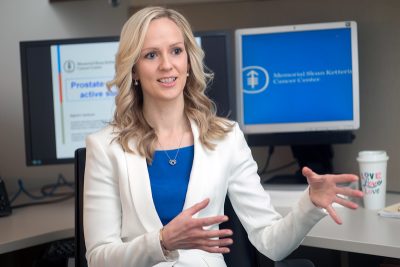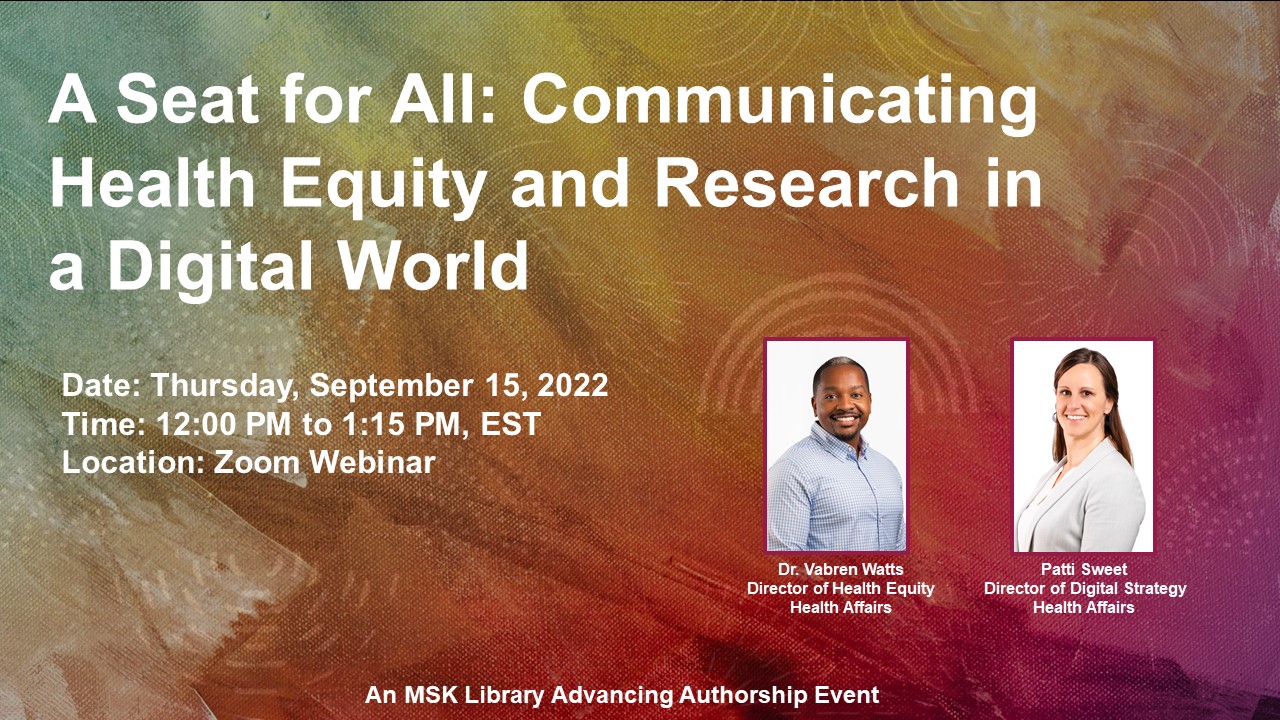Welcome to the first installment of the MSK Library Blog’s new series, Meet a Library User. These interviews will shine a spotlight on some of the many MSK employees who use the Library and the fascinating work that they accomplish.
In this inaugural post, we’re speaking with Dr. Sigrid Carlsson, MD, PhD, MPH, Director of Clinical Research at MSK’s Josie Robertson Surgery Center and Assistant Attending Epidemiologist. She holds dual appointments with MSK’s Department of Surgery in the Urology Service and with the Department of Epidemiology & Biostatistics. Dr. Carlsson frequently uses MSK Library services and we are delighted to have spent time getting to know more about her and her work at MSK.
The following conversation has been edited and condensed.

Image courtesy MSK Digital Asset Library
Could you discuss your research agenda, in simple terms? What current research projects are you working on that you’re particularly excited about?
Yes, certainly. I’m at Josie Robertson Surgery Center. It’s our ambulatory surgery center at MSK. Here we do surgeries where patients either go home the same day or after a night’s hospital stay. It’s within twenty-four hours, mostly. We do prostatectomies and mastectomies, and hysterectomies and all sorts of procedures. A lot of different surgeries—complex surgeries—are performed here, and of course the others are done at Main Campus. What I do here [at the Josie Robertson Surgery Center] is I am the Director of Clinical Research, so I oversee all our research activities that go on in this building. There’s urology, breast, head and neck, plastics, gynecology, anesthesia, nursing, and multidisciplinary research. It’s wonderful to be a part of. And with that in mind, we do a lot of studies, both clinical trials and also retrospective research studies. We need the literature to see what’s out there—what’s already been done and what we can do. We also put in a lot of grant proposals. So that’s where MSK Library is fantastic, and we really couldn’t do what we do without you.
That’s great, thank you. How did you become interested in cancer research, and prostate cancer research in particular?
Oh, good question, now I have to go back twenty years. I was living in Sweden, where I’m from, and I was in medical school doing a research project on evidence-based medicine. Screening in Sweden at the time, the government sent envelopes to women to get mammography screening and cervical cancer screening and I was wondering, why don’t men get an envelope to go for prostate cancer screening with a PSA test? So that’s what sparked my interest. And at the time I was in my surgery rotation during medical school and I met Professor Jonas Hugosson, who was running a large randomized trial of PSA screening versus no screening for prostate cancer. In those days, we didn’t have the same amount of evidence. So the question was, “Does early testing with this blood test really reduce prostate cancer mortality?” in the way we knew from mammography or with cervical cancer screening by doing the pap smear. And that’s really how I got into it. I’ve been an investigator of that trial—a trial in Göteborg in Sweden—for nearly twenty years. That trial really showed that screening does reduce prostate cancer mortality. And it was also part of a large European study. And now that trial has matured into another trial, the Göteborg-2 trial, which is looking at combining the PSA test (the blood test) with MRI (imaging the prostate), which is sort of the paradigm shift in prostate cancer screening today, that we incorporate blood-based biomarkers together with imaging. The field is evolving, and I’m still very curious and passionate about this topic.
Wow, that’s interesting that a government service first brought your attention to the discrepancies.
Yes, and also I think because of my parents, I mean, the apple doesn’t fall far from the tree. My dad was a doctor, and my mom is a nurse, and they were always very interested in preventive medicine—what we can do to find diseases early and prevent them and lifestyle and all of that. So it was also at home that I became interested. But then, the more I studied, the more I learned about the nuances and how complex it is because prostate cancer is such a heterogeneous disease. Sometimes we find low-grade cancers, and many of those men can live very long and happy lives without any treatment at all. Then the challenge is to find the aggressive ones early and treat those. So there’s a lot that goes into it.
You’re part of a Multidisciplinary Expert Panel convened by the Prostate Cancer Foundation to develop guidelines for prostate cancer screening and treatment for Black men in the U.S. Could you talk a little bit about the work that goes into establishing guidelines like these, and how you’ll be involving the MSK Library to support that work?
It’s definitely key that we gather the best available evidence to support any guideline recommendations on a public health scale. So that’s why the literature, the library service again is key because we need a methodologist who is an expert in searching the literature and using the keywords, which is a whole field of science in and of itself. You really know how to search multiple databases and choose the words and combine the ANDs and the ORs and which inclusion and exclusion criteria to have. And you really want to have a narrow enough search so that you don’t drown in 10,000 references to screen, but also a comprehensive enough search so that you are sure that you have included all the relevant references that are out there. So that’s why your expertise and methodology is really, really crucial. And so we work together. We are the experts of the topic and the field. We know some of those references, of course. And some of us have contributed to that evidence, but we also need an objective methodologist who can see from a bird’s eye perspective and help gather all the evidence in a smart way to synthesize it.
If you could tell the world just one thing about prostate cancer, what would it be?
I think we’ve made major headways in prostate cancer over the past years, so I think we are now very good at finding what patients need. As Dr. Scardino, the MSK urologist and former Chairman of Surgery, would say, “the right treatment for the right patient at the right time.” And I think we are very, very good at that in prostate cancer today. So, for example, if you have a man with low-grade disease, then all the guidelines say that active surveillance should be the first management option. But then if you have high-grade disease, then we know that a multimodal treatment regimen is recommended. And at MSK we have all those experts in one house. We have urologists, radiation oncologists, and medical oncologists, so we really have everybody in the field. I would say that we’ve learned so much about the biology and the natural history of prostate cancer that we know exactly who and when to treat. And also, having worked in the field of screening, we know that the blood test, PSA, is one of the best tumor markers that we have. One single blood draw can determine your long-term risk of developing lethal prostate cancer. It’s a very simple, cheap, and effective test, which is really remarkable. I don’t know of any other tumor marker that is as sensitive and specific as the PSA test.
It’s wonderful to hear you talk about this.
We all have our own soapboxes, right? But still, after twenty years, I’m still so fascinated by this field, and how it’s evolving, and what we can do to improve the lives of men at risk for this disease. It’s still the number one most common cancer among U.S. men, and especially Black men have increased risk. So we do whatever we can do to improve on that.
Could you share some of the ways you use MSK Library?
I use MSK Library all the time. For manuscripts, when we have summer students, urology fellows, postdocs, and faculty. I always reach out using the contact form, with our research question, finding out what’s been written before, because we don’t want to reinvent the wheel if somebody else has already done the work. And for grant submissions, it’s also key, and sometimes for our quality improvement projects. Say that we want to start a new clinical pathway, and we want to see what’s out there. And then this broader initiative with the guideline, it’s super helpful. And you are fantastic at systematic reviews. We work with your colleagues [at the Library] on systematic reviews, and using the Covidence software has been incredibly helpful. And the PRISMA flow chart, finding a search that’s comprehensive but also narrow enough that the scope becomes doable. I supervised two urology fellows, and they screened 3,000 papers over a couple of weeks over the summer. So it was a lot of work for the two of them, but it will be published in one of the major urology journals and will be a very highly cited paper. It’s so great, the service that you provide. And it is really a skillset that we don’t have as clinicians or researchers. It’s really a specific field of knowledge that you have as informationists. I’m your biggest supporter!
Final question for you, what’s your favorite thing about living or working in New York City?
Oh, I mean, it has everything, right? The people, the diversity, the vibrant environment—it’s the city that never sleeps! All the restaurants, the shows, the New York Philharmonic, Central Park, and especially working at MSK, it’s such a wonderful place. There’s no place like it, I would say. There are so many different departments, and we all come together to work. And I feel like everybody who’s here, we’re here for a reason and we have a purpose and a mission. I think people are very, very dedicated. And we always put patients first. We all come together for the same cause. Even the library service, you help contribute to disseminating knowledge to the world.
Many thanks to Dr. Carlsson for speaking with us. If you would like to know more about MSK Library’s services, please see our Help page. And if you already use the Library and would like to be featured in this series, don’t hesitate to reach out!
Interview by Rebecca Meng, MSLIS

